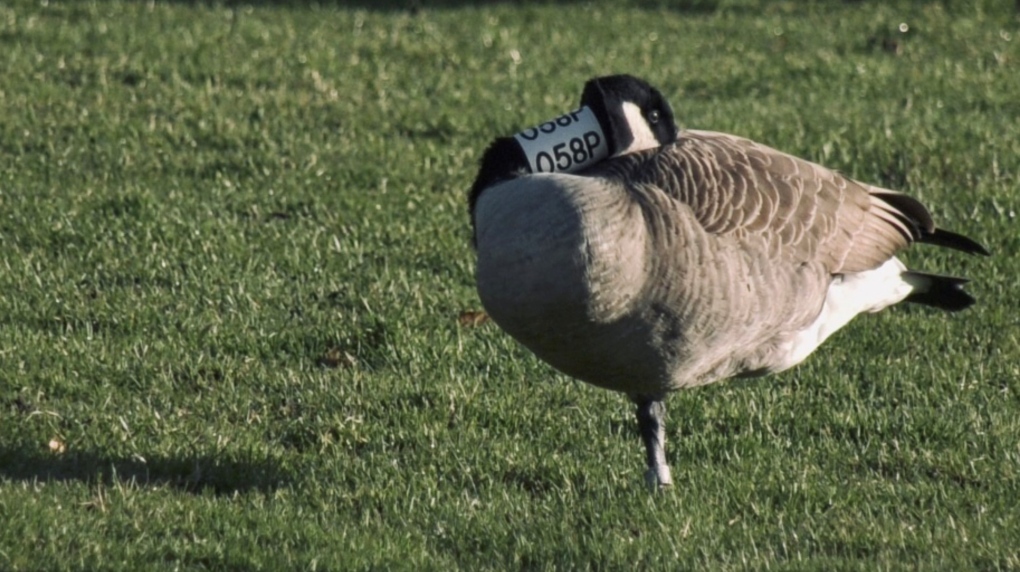'We couldn't quite believe it': B.C. researchers baffled after Nanaimo goose spotted in Chicago
 Researchers at Vancouver Island University are baffled that a Canada goose they tagged five years ago has been spotted nearly 3,000 kilometres away in Chicago.
Researchers at Vancouver Island University are baffled that a Canada goose they tagged five years ago has been spotted nearly 3,000 kilometres away in Chicago.
Researchers at Vancouver Island University are baffled that a Canada goose they tagged five years ago has been spotted nearly 3,000 kilometres away in Chicago.
“At first we couldn’t quite believe it," says Eric Demers, a biology professor at VIU. "This is so out of the way."
The tagged goose was identified in October by a woman who was jogging in Chicago's Lincoln Park.
Demers contacted the woman who was able to describe the goose’s unique neck collar and code.
“It was 058P and she detailed it very clearly,” adds Demers. “All these collars are unique and are the only ones given in North America, so it can’t be another one.”
The VIU professor is unsure why the goose travelled all that way. His theory is the goose either got lost, joined other geese that were going that direction, or was pushed by a storm.
“It’s anyone's guess,” Demers says.
In 2016 and 2017, 400 Canada geese were tagged in the Nanaimo area by Demers and VIU biology student Stew Pearce.
What they found so far is the majority of the geese they tagged stay in the Nanaimo area and may venture to the mainland or go as far south as Victoria.
However, some geese have been reported as far south as Washington state and Oregon, and as far east as Alberta.
A hunter in Fort McMurray, Alta., shot one of the tagged geese from Nanaimo two years ago.
“The general expectation and what we found in our results so far are that geese move north and south,” says Demers. “So having a goose go this far east was quite surprising.”
There are two ways people can report the tagged Nanaimo geese: on the VIU Goose Project website or the Banded Birds of North America website.
Geese can live up to 20 years, so Demers expects researchers may get results like this for many years to come.
CTVNews.ca Top Stories

Joe Biden pardons his son Hunter Biden on gun, tax charges, despite previous promises he wouldn't
U.S. President Joe Biden announced Sunday that he pardoned his son Hunter Biden on gun, tax charges, despite previous promises that he would not do so.
Canada Post presents union with 'framework' to reach deal as strike continues
Canada Post has presented the union representing some 55,000 striking postal workers with a framework to reach negotiated agreements, the corporation said.
'Devastating': Missing Surrey, B.C. teen found dead, family says
The family of a missing 18-year-old, who was last seen in Surrey over a month ago, says there has been a tragic end to the search.
The best tips to prepare your car for the winter
Slippery or snow-covered roads, reduced visibility and bitter cold are all conditions that can make driving difficult and even dangerous during cold weather months. CAA spoke with CTV Morning Live this week on some of the best ways you can winterize your car.
PM Trudeau 'surprised' provinces unanimous on accelerated defence spending: Ford
Ontario Premier Doug Ford says his fellow provincial leaders are united in pushing for Canada to meet its NATO defence spending targets ahead of schedule, and that Prime Minister Justin Trudeau was "surprised" to hear it.
Stellantis CEO resigns as carmaker sales continue to slump
Stellantis CEO Carlos Tavares is stepping down after nearly four years in the top spot of the automaker, which owns car brands like Jeep, Citroën and Ram, amid an ongoing struggle with slumping sales.
'Wicked' star Marissa Bode speaks out against 'harmful' ableist comments made about her character
'Wicked' actress Marissa Bode posted a video on TikTok asking for kindness after receiving ableist comments on social media.
Poilievre calls for asylum seeker cap, border plan as U.S. tariff threat looms
Conservative Leader Pierre Poilievre has demanded the federal government present a plan before Parliament to beef up border security as U.S. president-elect Donald Trump threatens to impose stiff tariffs on Canada.
Emergency crews battle large fire at Kitchener, Ont. townhouse complex
Waterloo Regional Police say Kingsway Drive will remain closed as emergency crews continue to battle a large blaze at a townhouse complex.

































